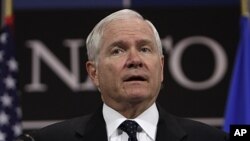U.S. Secretary of Defense Robert Gates has warned the 28 members of the North Atlantic Treaty Organization that the alliance could become irrelevant in a quickly changing world.
This was Gates’ final major speech before he retires June 30, and it was his strongest criticism of the NATO alliance during his tenure as secretary of defense.
In Afghanistan, Gates said the international force has exposed shortcomings in NATO’s military capabilities and in political will. As for the military operation in Libya, Gates said while every alliance member voted for the mission, less than half have participated and fewer than a third have been willing to take part in the strike mission.
"The mightiest military alliance in history is only 11 weeks into an operation against a poorly armed regime in a sparsely populated country - yet many allies are beginning to run short of munitions, requiring the U.S., once more, to make up the difference," said Gates.
Secretary Gates also criticized nations that - in his words - “are apparently willing and eager for American taxpayers to assume the growing security burden left by reductions in European defense budgets.”
"Future U.S. political leaders - those for whom the Cold War was not the formative experience that it was for me - may not consider the return on America’s investment in NATO worth the cost," he said.
Sean Kay, a NATO expert at Ohio Wesleyan University, says one problem is that the alliance is stretched out too thinly.
"There’s been an assumption since the end of the Cold War that NATO had to ‘go out of area or out of business’ - was the famous quote about NATO," said Kay. "And that created a logic train that the mission had to be additive - so we had NATO enlargement, we had new out-of-area operations and so forth. So you have expanding missions but declining resources. And that creates a massive strategic disconnect between goals and capabilities. And so absent those capabilities, the goals become less credible."
Or, as Secretary Gates put it - NATO must avoid becoming irrelevant.
"What I’ve sketched out is the real possibility for a dim, if not dismal, future for the transatlantic alliance," said Gates.
But sounding an optimistic note, Gates said NATO members have the means to halt the negative trends.
Kay says another problem is that European governments - like the United States - are facing drastic budget cuts.
"The Europeans are not going to coalesce and spend money on defense unless it is in their interest to," he said. "Right now, it’s in their maximum interest to avoid it. And we don’t help ourselves, I don’t think, when we just say well, they must do more - because it is in their interest to do as little as possible, because they are countries and they realize so long as they don’t do it, America will do it for them."
Kay says the Europeans must be given an incentive to change that view and be stronger partners in the alliance.
"The only way to accomplish that is to get NATO back to a very founding objective by actually reigning in and limiting its missions to the classic function of collective defense and insisting that over the next three to five years, we will be handing over lead responsibility for European security to the European Union," said Kay. "And then it’s up to them to figure out how they are going to invest in their national security interests in cooperation with the United States."
Experts say the successor to Robert Gates as U.S. defense secretary will have to address the serious challenges facing NATO.
Gates Delivers Blunt Message to NATO Partners




